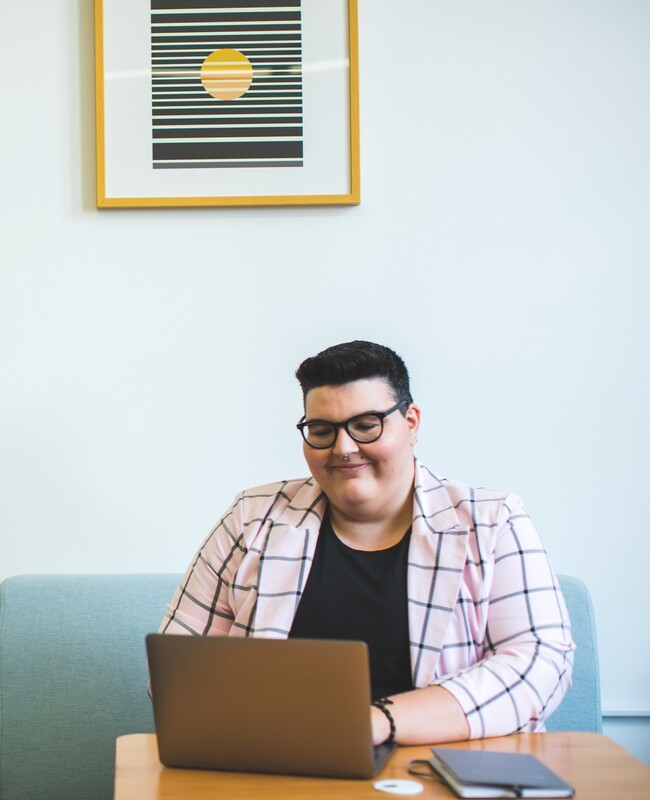|
In 2020, I finished my Foundation Certificate in Counselling and Psychotherapy, then applied to go to university to continue my studies… but I’d been refused full student loans and was freaking out. I was mad about the industry (I still often am) and I wrote about my experiences here. I honestly thought I might ruin my career before I even started, I was so scared to share my thoughts. Now, two years on, thankfully I am on the degree I applied for after a nerve-racking “Compelling Personal Reasons” appeal to Student Finance. I used to hold counsellors up on a pedestal. The middle-aged, middle-class women I saw in my workplace were so different to me, I didn’t see how I could fit in. My Introductory course and Foundation Certificate was held in Bath where people laughed at the way I said “hug” (I’m from the Midlands but don’t have a particularly strong accent). It was as if some had never met a working-class person before. I struggled to speak up in group work, which I now think was partly about class and power but I didn’t have the words to explain that back then. Our short “diversity” session (a tick box exercise in my view) resulted in most people not saying a word for fear of getting something wrong. I realised I spent most of that year sitting in groups with very polite middle-class people wanting to be seen as the Nice Middle-Class Counsellor Who Treats Everyone Equally ™. The problem with “treating everyone equally” is that it ignores, minimises and denies people’s experiences (the opposite of what we should really be doing as counsellors!) If I’d tried to talk about class on my course, it would likely have been met by a very awkward quiet room again. No doubt there was also fatphobia in the mix too, something I passionately write and train people on, fat working-class people often getting the brunt of the blame for being a “burden on the NHS”. This is no disrespect to my course pals, they were lovely so I don’t want to point the finger at people but rather look at this on a systemic level. There are a lot of Nice Middle-Class Counsellors ™ doing great work in this industry, and the issue is not individual counsellors but the lack of intersectional approaches, diversity and inclusion from the top. When coming to the end of my Foundation Certificate I was asked why I wasn’t continuing at the same college (seen as one of the “gold standard” colleges) to which I told them I couldn’t afford it as they offered no financial help. The response I got was either “but you can pay by installments” (erm, where do they think that money is magically coming from?) and “we have a bursary”, which is for a person of colour. I am not a person of colour. That bursary should go to a person of colour, but did it? Being in Bath their answer is often, “it’s a white area” but a number of us were travelling from Bristol so that just seemed like another excuse. I got the sense that their “one bursary place” was more about them trying to be seen as a Good College For Nice Middle-Class Counsellors Who Treat Everyone Equally ™. There are lots of these colleges, so I am by no means singling this particular place out. These training establishments offer very good training, there’s no doubt, but only for a specific demographic. I have various privileges which meant I could train at the college in Bath, if only initially, but also I have managed to pay for all the *extras* of which there are a lot in counselling training! Insurance, membership body fees, supervision, personal therapy, transport costs… There’s a lot to take into account so even with student loans (which don’t cover much in terms of living costs) it’s A LOT, and that’s without factoring in having to work for free (for me in two different placements) to build up placement hours. This isn’t to put anyone off who wants to train to be a counsellor but this is the reality and is a large part of why the industry is so white and middle-class. Going to university in Newport (Wales) to do a degree in counselling was very, VERY different from the college in Bath – OBVIOUSLY. But for me, I was relieved to find myself in a place with a slightly more varied cohort, I say “slightly” because of course it’s still mostly women. I’ve always found it strange that an industry built on theories by mostly men is so dominated by women. Through speaking to various trainee counsellors at different training establishments, I’ve personally started to notice a theme; there can be a tendency for the universities/colleges to prepare trainees for lower-end wages in charities or agencies, whereas the private colleges (where you need to pay for it yourself as they don’t offer financial help/loans) set people up to go into private practice. One particular college I heard about doesn’t require students to do placements in agencies, but instead students go straight into PAID private practice. These students are the ones who can afford this privilege of course, so predominately white middle-class middle-aged people, who are being trained to immediately see mostly middle-class clients. These colleges, and students, may not talk about class, race or any other “difference” because they are being primed to stay in a middle-class bubble. These private colleges almost feel cult-like to me sometimes; they like you to see therapists and supervisors who have trained with them, then train to be supervisors with them, all “keeping it in the family” (cult), conveniently continuing to make more money out of students. These colleges don’t want working-class people, or people from marginalised groups, as they need to uphold this elitism. This is the same in many other industries of course; money comes first and they always make sure they maintain their power at the top. Of course the membership bodies mirror this too. It also means these colleges don’t have to change their curriculum to accommodate anyone “different” (I put this in quotation marks because what is “different” in this sense is only ever decided by those power). They can do their few hours of “difference and diversity” to tick a box, whilst sticking to the same old theories mostly written by middle-aged middle-class men. There are very few undergraduate degrees in counselling, like mine, in the UK. Most courses are at Master’s level, which is another major form of exclusion as you can’t do these courses unless you have a degree. My course is Integrative with a splash of Pluralism – a concept popularised by influential white middle-class men who tell us we should “prize diversity” (Cooper and Dryden, 2016). I’m glad be on a course with a little more “diversity” and to be learning more modern approaches to integrative therapy. My course had a online counselling module long before the pandemic – ahead of the game! Online counselling allows for more inclusion, for both counsellors and clients, so it’s important in my view to not rush back to “normal”. I think “normal” was old-fashioned, exclusionary and snobby, and I’m delighted to be part of a changing counselling industry that can offer more flexibility, adaptability and inclusion. Attendance and able-bodiedness has always been a focus in therapy (for both clients and counsellors), some courses insisting on 100% face-to-face attendance. Chronic illnesses, disabilities, social anxiety, work and family commitments, and many other factors can make it difficult for people to attend in-person, both counsellors and clients. Our training providers and membership bodies need to reflect that by valuing online learning (and counselling) and supporting students by meeting their needs. If there’s a silver lining of this awful pandemic, it’s an opportunity to work towards the kind of accessibility we should’ve already had in the industry.
This year has taught me the importance of needing to be adaptable, creative and open-minded in the ways I offer counselling, and how this can still be done in a boundaried and ethical way. I continue to learn and remind myself of the natural neurodiversity amongst people and how everyone needs to communicate, learn and engage in different ways. I continue to keep learning and checking my biases about race, gender, sexuality, body size and appearance, neurodivergence, disability, and more, because this is so crucial for working ethically, and I always encourage other counsellors to do the same. I’m continually grateful for the privilege of being able to do this work with clients in my placements, in my job as a group facilitator, and running training and workshops. I’m sure my last year is about to fly by and I’ll be writing another follow-up blog before I know it as a qualified counsellor! I'm running an online body acceptance workshop on 13th July - find out more here!
0 Comments
Leave a Reply. |
Categories
All
Archives
June 2024
|

